"... so great a cloud of witnesses.”Throughout the year, the Southern New England Conference of the United Church of Christ reproduces the Daily Lectionary for use by churches. These are the suggested readings for Wednesday, March 31st: Psalm 70; Isaiah 50:4-9a; John 13:21-32; and Hebrews 12:1-3. I would encourage you to read these short selections as part of your Lenten practice.
The CDC is warning about a fourth surge of COVID 19 infections, and they are advising and encouraging leaders to maintain COVID protocols. They are doing the same with individuals hoping that we will all stick with the protocols for a while longer. There is light at the end of the tunnel, but if we abandon precautions too soon, it will delay our exit from the pandemic. The doctors and researchers at the CDC realize how desperately we wish to be free of the COVID restrictions and return to a normal lifestyle. This desire is in large part fueled by our exasperation with our isolation. Surveys document our exhaustion with online gatherings. They have shown that television was once a leisurely release. People looked forward to binge-watching a favourite program on a streaming service. Now television has become burdensome. It only reminds us that we are sitting on our couch instead of out doing something. These same emotions apply to our spiritual selves. We need the community of believers. We need the called-assembly, the church. We need, as we read today in Hebrews, to believe that “we are surrounded by so great a cloud of witnesses.” We are not as comfortable in isolation as we are among the community. Think back to our Gospel stories about the life of Jesus. His public ministry begins when He travels to the Judean desert and becomes a part of the community around John the Baptist. After Jesus’ baptism and His return to Galilee, the first thing He does is call a community of disciples to gather around and with Him. Jesus had been exposed to John’s separated community in the desert, a community that saw the rest of the world as fallen. Jesus rejected this model. He threw Himself into the lives of ordinary and extraordinary people all around Him, and by extraordinary I mean the few who were forced out of society – the sickly, the sinners, the prostitutes and tax collectors – and who Jesus brought back into community. Jesus does choose moments alone in prayer, but for the most part isolation is not presented in a positive light in the Gospels. You may remember last week’s reading of Jesus’ isolation prior to the healing of Bartimaeus. You will hear of Jesus being alone and deserted by His followers on Good Friday. You will hear His pitiful cry of abandonment as He hangs on the cross: “‘My God, my God, why hast Thou forsaken me?’” When we move into the apostolic period, Paul speaks constantly of the called-assembly of the church. Paul’s mission, and that of all the apostles, is to form and establish these communities. The earliest extant piece of Christian writing is 1 Thessalonians. There we read that as the apostles have striven to build community so that community in turn strives to do the same: “… because our message of the gospel came to you not in word only, but also in power and in the Holy Spirit and with full conviction; just as you know what kind of people we proved to be among you for your sake. And you became imitators of us and of the Lord, for in spite of persecution you received the word with joy inspired by the Holy Spirit, so that you became an example to all the believers in Macedonia and in Achaia. For the word of the Lord has sounded forth from you not only in Macedonia and Achaia, but in every place where your faith in God has become known, so that we have no need to speak about it.” Hebrews’ “cloud of witnesses” speaks of the unseen spirits who stand with us as church and believer, but there is also the cloud of witnesses who are the visible church. We are called to gather to support one another. I remember opening the church hall for a weekly meeting of AA. Doing so, you get to meet the regular leaders of the group. One Saturday evening, I was talking to a man who had been sober for quite an extended period of time. I asked if he were still tempted to start drinking again. His answer impressed me and has stayed with me. He told me that he no longer comes the meetings for himself, but for the next person who needs him to be there. I wish and pray that Christians would all have this same attitude regarding the sacred work of the called-community. We come together for our benefit and, just as importantly, for that of others. After today, we will have the chance to gather in person and online for the Maundy Thursday worship Service. The church building will be open from just before noon until just after 3:00pm on Good Friday. We will come together outdoors before sunrise and again at 10:00am in the church building on Easter. These are not obligations that must be fulfilled or else we are charged with a sin. These are powerful opportunities to worship together, to stand stronger, to each help one another, and to be blessed as a part of Jesus’ community. The pandemic has shown us how burdensome isolation can be. I hope we are able to translate this realization into why the church as community is so important. Holy Week and Easter will come and they will pass, but the blessing of the church community is ongoing and constant. I hope and pray that we can see it as such and know that “Whoever you are, you are welcome here.” If you’d like, here is the link to the Southern New England Conference’s daily reading schedule: www.sneucc.org/lectionary.
0 Comments
The "foolishness" of what we believeThroughout the year, the Southern New England Conference of the United Church of Christ reproduces the Daily Lectionary for use by churches. These are the suggested readings for Tuesday, March 30th: Psalm 71:1-14; Isaiah 49:1-7; John 12:20-36; and 1 Corinthians 1:18-31. I would encourage you to read these short selections as part of your Lenten practice.
We continue to make our way through Holy Week today. Yesterday we spoke about Jesus’ Messiahship being so different from what the people expected and what the authorities judged orthodox that Jesus was rejected quickly. There were high hopes that Jesus would be a saviour like Judas Maccabaeus, not one like Isaiah’s Suffering Servant. Even though intrigued by Jesus and mesmerized by the wonders He performed, Jesus’ contemporaries could not relinquish their own dogmas. This was an important lesson both learned and repeated by Christians. As a lesson learned, it is stated rather famously by Paul in today’s 1 Corinthian’s selection: “Jews demand signs and Greeks desire wisdom, but we proclaim Christ crucified, a stumbling-block to Jews and foolishness to Gentiles, but to those who are the called, both Jews and Greeks, Christ the power of God and the wisdom of God.” The cross is perceived as both obstacle and foolishness, says the evangelizing apostle who is building the first-generation church, but in truth it is the power and wisdom of God. Paul did not shy away from this foolishness of a crucified Saviour. If we did not have the Gospels, if we only had Paul’s Epistles, we would know nothing of Jesus’ life before Good Friday. Paul’s gospel, at least his written gospel, begins with the cross. The very obstacle of the Suffering Servant becomes Paul’s point of “the sword of the Spirit, which is the word of God.” (Ephesians 6:17) Paul realized the limitations of orthodoxy and dogma as such. They constrained the freedom of God to continue to reveal Himself. It is one thing to apply this lesson in retrospect. We self-righteously fault the Jewish people of Jesus’ day for holding on to their dogmas and rejecting Jesus, but we then refrain from applying this lesson to Christianity. It is a part of our continuing spiritual DNA to hold on to what is made forever sacred, is made into unchanging dogma, by the fact of its antiquity. In the Greek philosophy that provided the scaffolding of eventual Christian theology, change was a sign of inferiority and anathema to God. We have absorbed the transgression we assigned to the people who rejected Jesus and destigmatized it by claiming our unchanging dogma is different. It is different in that we accept Jesus as the Son of God, but it is the same when we dogmatize Jesus because then we reject Paul’s warning of Christ as a stumbling-block and foolishness. God’s wisdom is going to startle – even Christians. I’m reading an interesting book presently (thank you inter-library loan). It is Mad at the World: A Life of John Steinbeck by William Souder. Steinbeck was not a religious person. He was raised Episcopalian, but was agnostic. His masterpiece was The Grapes of Wrath. It decried the fate of the disposed farmers of the Depression era. Steinbeck was brutally honest in his portrayal to the point that his book was banned in some communities and he was labeled a Communist. The growers’ association, who took advantage of these displaced people, sullied Steinbeck’s character and morality because he revealed the immorality of what was happening. If Jesus walked the fertile valleys of 1930’s California, would He have dwelt among the impoverished or sat in on grower’s association meetings? Where would Jesus’ moral compass point Him to? I think Jesus would have chosen the dispossessed. I think Jesus would have appreciated Steinbeck’s efforts to shine a light on the immoral treatment of these families, the same Steinbeck who was judged immoral for daring to point out the immorality. To be open to God’s continuing, and challenging, revelation does not equate with moving past Jesus. It means making ourselves more open to Jesus and to His “foolishness,” to not be satisfied by repeating dogmas, but to invest ever more fully in “Christ the power of God and the wisdom of God.” This is the call of Holy Week. If you’d like, here is the link to the Southern New England Conference’s daily reading schedule: www.sneucc.org/lectionary. For larger print text or to download, click the PDF file below.
It worked for the Maccabees, why not Jesus?Throughout the year, the Southern New England Conference of the United Church of Christ reproduces the Daily Lectionary for use by churches. These are the suggested readings for Monday, March 29th: Psalm 36:5-11; Isaiah 42:1-9; John 12:1-11; and Hebrews 9:11-15. I would encourage you to read these short selections as part of your Lenten practice.
Today is the Monday of Holy Week. Out of the 52 weeks of the year, this is the single week the church names Holy. This is the week when we remember Jesus’ last days. Yesterday Jesus entered Jerusalem and was hailed as God’s anointed, the Messiah, the Christ. People saluted Him with cries of “Hosanna to the Son of David,” basically “Save us we pray, Saviour sent from God.” Their hopes were legitimate. Judas Maccabaeus in the mid-second-century BCE was a Jewish guerrilla leader who defended his country from invasion by the Seleucid king Antiochus IV Epiphanes. He proved to be a military genius, overthrowing four Seleucid armies in quick succession and restoring the Temple of Jerusalem. The Seleucids were the successors of Alexander the Great. His empire was one of the largest in history. They had conquered and ruled the land of Israel for two centuries. And this guerrilla leader, Judas Maccabaeus, of a ragtag band of zealots, overthrew them. The Maccabees ruled Judea for a hundred years. Then the Romans arrived and in 63 BCE. General Pompeii captured Jerusalem and the Jews were once again under foreign dominion. It is quite possible that the people of Jesus’ generation may have heard firsthand accounts from their elders of what it was like to have once lived free, to not have the soldiers of a conquering oppressor garrisoned in your capital and overlooking your Temple. Messianic expectations ran high in Jerusalem that first Palm Sunday. The people believed that God would send another warrior-saviour to free them from yet another pagan army just like God had done when He sent Judas Maccabaeus to defeat the Greeks. And what an appropriate time for God to do so as this Galilean wonder-worked paraded into Jerusalem for the Feast of Passover, the celebration of God’s miraculous liberation of the Jews from Egyptian slavery. Jesus did not seem at all concerned about the Romans who were watching Him. Jesus was fearless in the face of such military might. Surely, this could be the Son of David, the anointed Saviour, therefore, “Hosanna,” “Save, I pray!” This is one of those clear examples of Jesus surprising people of faith, doing the absolute unexpected. This is a lesson for us even now. Jesus is always going to be a challenge because Jesus will always call us forward. The city of Jerusalem was full of expectation on Palm Sunday. The people would have risen-up with Jesus if Jesus were a warrior. They were ready to follow on their terms, based on their expectations. But we all know the story. Jesus would never lead an army. Jesus would never condone violence. And in this way Jesus fulfilled the prophecies of Isaiah’s Suffering Servant. The tradition was there, but the people didn’t want this sort of Saviour: “Here is my servant, whom I uphold, my chosen, in whom my soul delights; I have put my spirit upon him; he will bring forth justice to the nations. He will not cry or lift up his voice, or make it heard in the street; a bruised reed he will not break, and a dimly burning wick he will not quench; he will faithfully bring forth justice. … I have given you as a covenant to the people, a light to the nations …” As we begin Holy Week, let us learn the lesson of Palm Sunday. Let us not confuse our expectations of what God should do with what God does. Let us strive to seek God’s way as revealed perfectly in the life, ministry and message of our crucified Saviour. And may this help us to make Holy Week holy. If you’d like, here is the link to the Massachusetts Conference’s daily reading schedule: www.sneucc.org/lectionary. Bartimaeus “followed him on the way.” Throughout the year, the Southern New England Conference of the United Church of Christ reproduces the Daily Lectionary for use by churches. These are the suggested readings for Saturday, March 27th: Psalm 118:1-2, 19-29; Jeremiah 33:10-16; and Mark 10:32-34, 46-52. I would encourage you to read these short selections as part of your Lenten practice.
What a powerful Gospel passage we read today. You can feel the psychological anguish of everyone involved. The pronouns are not well defined in the passage, but it appears that the “they” the passage opens with refers to the disciples. So if I may, “[The disciples] were on the road, going up to Jerusalem, and Jesus was walking ahead of [the disciples]; [the disciples] were amazed, and those who followed were afraid.” Jesus is walking by Himself deep in thought, and one can only imagine, terrified. The thought of crucifixion had to be a fearful prospect even for Jesus. The disciples sense Jesus’ distress and His need to be left to Himself. They give Jesus room; they follow behind. The disciples themselves are unsure of what to expect. Jesus has been trying to tell them about what lay ahead in Jerusalem. They heard His words, but they could not make sense of them. Their own expectations deafened them to Jesus’ words. They were amazed at what was taking place. There were still others a bit further back. These may have been casual followers of Jesus, maybe other Galileans who had been somewhat familiar with all the accounts of Jesus’ ministry and miracles. This group is afraid. Something is wrong, but they have no idea of what. With all of this psychological drama taking place, pulling us into the thoughts of Jesus, the disciples, and the crowd, we are startled by Bartimaeus. Everyone in his or her own way is lost in his or her own thoughts. Then blind Bartimaeus shatters this cocoon, shouting, “‘‘Jesus, Son of David, have mercy on me!’” The crowd instinctively rebukes this intrusion and orders him silent. I think it would have been understandable for Jesus to have not responded, to maybe not even have heard the plea as He was lost in the thoughts of His own troubles, but Jesus is Jesus. He calls the blind man over. Even when lost in the thoughts of His own desperate situation, Jesus makes time for blind Bartimaeus. Jesus is contemplating giving everything He has, even to the point of His own life, and yet Jesus still has the compassion to pause and heal Bartimaeus. The healing is granted and Jesus tells Bartimaeus “Go.” Just like so many others who had been healed by Jesus and simply went on their way, Jesus says to Bartimaeus, “Go.” Here, though, something remarkable happens that maybe brought a bit of healing to Jesus the healer. Bartimaeus stayed. Bartimaeus followed Jesus “on the way.” This may only refer to the road leading to Jerusalem or “the way” may be a reference to the earliest iteration of Christianity (cf. Acts. 9:2; 18:25, 26; 19:9, 23; 22:4; 24:14, 22). We often do not know who the people are who Jesus heals, but here we know his name, Bartimaeus son of Timaeus, and that he is from Jericho. This is an actual person familiar to the community of the Marcan church. Bartimaeus shared this firsthand account with the original people of this Gospel. He had remained faithful to Jesus. He became a part of “the way.” Bartimaeus saw Jesus’ psychological suffering and then most likely His physical suffering, and Bartimaeus knew that with all of this, Jesus still stopped to help him. And Bartimaeus “followed him on the way.” We are about to enter Holy Week. We are about to walk with Jesus those last momentous and terrifying steps of His life’s journey. We follow because of who He is. We follow a Saviour willing to suffer and die for us as a whole, and one who with all of this ahead of Him, still stops for a blind beggar. I judge it a privilege to follow Jesus and remain with Him "on the way." If you would like to join us for our Palm Sunday Service, please send me an email ([email protected]) and I will get you the login link. If you’d like, here is the link to the Massachusetts Conference’s daily reading schedule: www.sneucc.org/lectionary. The rejected cornerstoneThroughout the year, the Southern New England Conference of the United Church of Christ reproduces the Daily Lectionary for use by churches. These are the suggested readings for Friday, March 26th: Psalm 118:1-2, 19-29; Jeremiah 33:1-9; and Philippians 2:12-18. I would encourage you to read these short selections as part of your Lenten practice.
Today is our sixth Lenten Friday, days that are especially solemn within a season that is especially solemn. Today we read that Jeremiah has the unenviable task of being the prophet who prepares Jerusalem for defeat, destruction and deportation. He advised everyone in the city to surrender so that lives would be saved. Jerusalem was not going to win this battle. Understandably, the authorities looked unkindly on such messaging and they imprisoned the prophet. In the book of Jeremiah, it is written: “Concerning the houses of this city and the houses of the kings of Judah that were torn down to make a defense against the siege-ramps and before the sword.” The people of Jerusalem were trying to proverbially circle the wagons. They were dismantling houses within the city’s walls to bolster the walls. Jeremiah foretells that these efforts are futile. Sometimes we feel like the best defense is to close ourselves off, to build walls, to keep others out no matter what we must do to ourselves to accomplish this. I am sadly amazed at what some Americans are willing to sacrifice in order to keep up the walls, to prevent the outsider and the disenfranchised from getting inside. I’m afraid that even the sacredness of our democracy is not exempt from being “torn down to make a defense” against emerging voices and awakened activists. We will even destroy what we have to protect us from these others, but as Jeremiah warns, these efforts are futile. They only prolong the illusion. They only make the collapse more dramatic. Remaining with this imagery of building walls of exclusion, the Psalmist today writes of the rejected stone. This metaphor was embraced by the earliest Christians to explain Jesus’ ministry: “The stone that the builders rejected has become the chief cornerstone. This is the Lord’s doing; it is marvelous in our eyes.” Jesus is not a part of the old wall of exclusion. Jesus is not about protecting us from them. He actually reaches out to the excluded and the demonized. Jesus is the cornerstone of a new structure, the cornerstone of walls that support buildings that give cover and protection to all who wish to enter. Rather than destroying what is within the walls to preserve the illusion of isolation, Jesus inspires believers to beckon outsiders inside and to use their gifts and talents to keep building this new structure in ways once unforeseen. Paul puts it nicely for us today: “In the midst of a crooked and perverse generation, in which you shine like stars in the world.” Christians don’t hide behind walls. Christ calls us to go forth “in the midst of a crooked and perverse generation.” Out amongst the people of the world, out amongst the racism, xenophobia, sexism, violence and greed of the world, Christians are to “shine like stars.” We are to be activists building the better structure of which Jesus is the cornerstone, the one rejected by the ways of the world, but the one that is “marvelous in our eyes.” And please remember that we don’t ever do this alone. The work is too much. The futility too real. IF we do this alone. Rather, the motivation to build a better world and the strength to actually do it comes from God: “It is God who is at work in you, enabling you both to will and to work.” On this sixth Lenten Friday, let us concentrate on the rejected cornerstone who hangs on the cross, the cross which in turn is the fundamental rejection of the ways of the world. Let us not hide behind walls, but rather follow the Saviour who hangs on the cross to finally and forever breakdown the walls of separation. No one was at the cross with Jesus. No one deserves His salvation. This means that all of us, saint and sinner, are all welcomed inside because this is the will and way of Christ. If you’d like, here is the link to the Massachusetts Conference’s daily reading schedule: www.sneucc.org/lectionary. "Let the same mind be in you that was in Christ Jesus"Throughout the year, the Southern New England Conference of the United Church of Christ reproduces the Daily Lectionary for use by churches. These are the suggested readings for Thursday, March 25th: Deuteronomy 16:1-8; Psalm 118:1-2, 19-29; and Philippians 2:1-11. I would encourage you to read these short selections as part of your Lenten practice.
Jesus dies on the cross in complete faithfulness to His gospel. Jesus’ entire life is the proclamation of uncompromising love. Jesus reveals a God who is defined by love (1 John 4:16), and Jesus commands us to imitate that love (John 13:34). Philippians 2 is a much-referenced and reverenced early Christian hymn to Jesus’ humble Incarnation as one of us. Those first believers were duly impressed by the fact that Jesus emptied Himself of His divinity in order to take the form of a slave, one wholly devoted to the service of others, namely us. The Greek verb is κενόω (kenóō) and becomes the basis of the term in Christian theology – kenosis. This theology gets a lot of theologians nervous. If it were not an indisputable biblical reference, it would be rejected as insufficiently Christian. It cannot be rejected, however, because Philippians is one of the seven authentic Pauline letters, and furthermore, it is found in Paul’s quotation of an even earlier, pristine Christian hymn. The first-generation believers were impressed and excited by the observable fact of Jesus’ ordinary humanity, His obvious connection with us, that was combined with the faith-based realization of His extraordinary divinity. To be faithful to both natures those earliest believers proclaimed in their worship that Jesus had freely emptied Himself of His divinity so that He could be one of us. This is a profound expression of who Jesus of Nazareth is as the Christ, Lord, Son of God. These were people who may have witnessed the life of Jesus of Nazareth directly or possibly through the stories of an eyewitness. Jesus as us was indisputable for them. They had seen Jesus and His human nature was unquestioned, even to the point that Jesus was “obedient to the point of death – even death on a cross.” Then something extraordinary happened that forced them to think in exciting, new ways. Miracles had been performed by holy people in the biblical tradition prior to Jesus and would continue to be performed in the biblical accounts after Jesus, but Jesus was different. The extraordinary event was the resurrection. The evidence of the empty tomb and the mystery of the post-resurrection encounters compelled those first-generation believers to reevaluate the nature of Jesus. He was more than holy. Jesus was of God: “… and every tongue should confess that Jesus Christ is Lord (Κύριος, Kurios).” In order to make sense of Jesus’ full humanity in the light of the resurrection revelation of His full divinity, the first Christians sang joyously of kenosis. Paul and the readers at Philippi would have shared in the tradition of this early Christian hymn, but the apostle adds an important introduction. Paul will not let the Philippians only marvel at the nature of Jesus. He insists that as followers of Jesus we must seek to be like Jesus. Jesus emptied Himself to be as one of us so that we could fulfill ourselves as being like Jesus. Accordingly, Paul writes: “Let each of you look not to your own interests, but to the interests of others. Let the same mind be in you that was in Christ Jesus, who, though he was in the form of God, did not regard equality with God as something to be exploited, but emptied himself, taking the form of a slave, being born in human likeness.” We approach Christ and our nature as Christians by looking not to our own interests, but to those of others. We seek to serve rather than to exploit. In this way, we honour and praise Jesus, and we fulfill our calling as Christians. We live in a violent society that we have chosen to tolerate. We refuse to enact sensible gun legislation because we think people are responsible enough to own high capacity, semi-automatic murder weapons and obviously people are not. Jesus emptied Himself to show us a better way. He went to the cross to show us that the way is not through violence or revenge. And He calls us to imitate His example. I often hear that this is a Christian country. Let’s prove it be living in imitation of our loving, crucified Lord. If you’d like, here is the link to the Massachusetts Conference’s daily reading schedule: www.sneucc.org/lectionary. The prophet's unrecognized messageThroughout the year, the Southern New England Conference of the United Church of Christ reproduces the Daily Lectionary for use by churches. These are the suggested readings for Wednesday, March 24th: Psalm 119:9-16; Haggai 2:1-9, 20-23; and John 12:34-50. I would encourage you to read these short selections as part of your Lenten practice.
We have been enjoying some interesting discussions about prophecy in our Bible study group recently. (If you would like to join in our next meeting is on March 29th at 7PM. Send me an email at [email protected] and I’ll get you the login link.) At our last meeting, we discussed this Haggai passage specifically. Some background: The book of Isaiah most likely consists of three separate books. The third Isaiah book is found in chapters 56-66. This is a late Exile prophet writing for a people who are envisioning a return to the homeland of their ancestors. His writing concludes with this revelation of God: “Heaven is my throne and the earth is my footstool; what is the house that you would build for me … This is the one to whom I will look, to the humble and contrite in spirit, who trembles at my word.” (66:1,2) Further back in Israel’s history, before the Exile, Jeremiah had a confrontation with one who claimed to be a prophet, Hananiah son of Azzur. Jeremiah has been proclaiming Jerusalem’s imminent defeat. Instead, Hananiah promises restoration and his order of priorities is first the return of the gold vessels of the Temple, second the restoration of the king, and lastly a return of those who had been sent as surety to Babylon. Hananiah dies as a false prophet. (ch. 28) Now an impoverished remnant returns to Jerusalem and Haggai prophesies to them. He tells them of the restoration of Davidic majesty through Zerubbabel. This Davidic heir has Messianic expectations pinned to him. However, Zerubbabel fades unnoticed into history. Nothing becomes of him. And he is the replacement for an even earlier hope, Sheshbazzar, who likewise failed to live up to the expectations. Additionally, Haggai foresees the rebuilding of a Temple more richly adorned than Solomon’s: “Once again, in a little while, I will shake the heavens and the earth and the sea and the dry land; and I will shake all the nations, so that the treasure of all nations shall come, and I will fill this house with splendour, says the Lord of hosts. The silver is mine, and the gold is mine, says the Lord of hosts. The latter splendour of this house shall be greater than the former, says the Lord of hosts; and in this place I will give prosperity, says the Lord of hosts.” What happened to Third Isaiah’s admonition that God was not impressed with a gilded house, but with a people who served as His living temple through the way they lived? What about Hananiah being judged a false prophet for his insistence that Temple treasures were of the utmost importance? How do we reconcile this with Haggai’s emphasis upon the splendour of the envisioned new Temple? With this earlier tradition in mind, and considering the fact that Haggai’s predictions were left unfulfilled, isn’t it possible that Haggai’s numinous prophetic experience was misinterpreted by him? Could he have experienced a powerful presence of God that assured him of restoration and the abiding divine presence, but that Haggai expressed this too traditionally as a return to the old rather than to the ushering in of the “new covenant” (Jeremiah 31:31) that Rev. Terry spoke about in her sermon this past Sunday? This past weekend I read an intriguing article in the Boston Globe. Here’s an excerpt: “If there was one thing he’d learned from his forays into the history of science, it’s that generations of people tend to look in the same place for answers. It takes a Darwin in the Galápagos to really change what we think we know — and make a new truth seem as though it had been obvious all along.” (www.bostonglobe.com/2021/03/19/magazine/how-college-dropout-new-hampshire-found-shakespeare-secret-all-phds-missed ) I hope and pray that each Lenten season pushes us to look beyond the same places and the obvious, and to discover the fresh insights that our faith in a crucified Saviour calls us toward. Remember that Jesus disrupts and rejects the Temple and spends His time among society’s, and religion’s, outcasts, and dies as one of the same. The tradition of our faith is not to be limited by the traditional. If you’d like, here is the link to the Massachusetts Conference’s daily reading schedule: www.sneucc.org/lectionary. "You are my witnesses."Throughout the year, the Southern New England Conference of the United Church of Christ reproduces the Daily Lectionary for use by churches. These are the suggested readings for Tuesday, March 23rd: Psalm 119:9-16; Isaiah 44:1-8; and Acts 2:14-24. I would encourage you to read these short selections as part of your Lenten practice.
“You are my witnesses!” A young man in Georgia goes on a shooting spree at massage parlors. He is a deeply engaged Evangelical Christian. He has been taught that impure thoughts are as evil as actually following through with them, which he did also. He has been taught that his church sanctions only heterosexual sex within the bounds of marriage and all other outlets are perversions of God’s natural order. He believes that his sexual indiscretions will send him to eternal hell. I cannot help but wonder how it is that a man so concerned about his moral character and his standing before God’s judgment could murder eight people without the same compunction as viewing pornography or even visiting massage parlors. What has he been taught that makes him so fearful of damnation because of his sexual proclivities and not as fearful of damnation by murdering eight people? In many conservative, Evangelical churches it is the moral responsibility of women to not tempt men. Their bodies are judged as tools of evil. They are every generation’s Eve. Just as Adam seems doltish in Genesis: “Here take this fruit. Yeah, O.K,” so do men in this morality play. Men are judged incapable of controlling their sexual appetites, but it can’t be their fault. It must be the woman’s. It still must be Eve’s. For as much as many a conservative church wants to present the male as dominant per God’s order, the same theology makes men seem pitiful and weak. Their urges cannot be controlled so women must bear the moral brunt of being the temptress rather than the man as the predator. Thus, on top of the Atlanta shooters mental derangement, this misogynist theology helps to lead to his violence. It seems clear that the Atlanta shooter’s church hyped sexual morality, but where was their voice against violence? How is it that this sick man could perceive the sexual sin, but could not fathom the violent one? Were violence and guns coopted into Jesus’ gospel somehow? How is it that Christian fanatics, really fanatics of any religious stripe, justify the coupling of faith and violence? How do Christians storm the Capitol with wanton acts of violence and even murder and carry the image of the cross and invoke Jesus’ name simultaneously? We are in the final weeks of Lent. I hope that by now we have realized that Jesus goes to the cross triumphant. Jesus remained faithful to His gospel ideals even when the most despicable acts of torturing-violence were used against Him. He remained true. Jesus remained peaceful in the face of this violence. He prayed for the forgiveness of His tormenters rather than hurling curses at them. He remained true. The cross is the triumphant symbol of Jesus’ absolute and uncompromising rejection of “an eye for an eye.” The cross is the militant expression of nonaggression. This is the lesson churches need to proclaim and teach in a world obsessed with violence. “You are my witnesses!” If you’d like, here is the link to the Massachusetts Conference’s daily reading schedule: www.sneucc.org/lectionary. |
NewsFaith, love and chitchat. Categories
All
Archives
June 2024
Follow
|
||||||
|
SERVICE TIMES
Sunday 9:30-10:30am Children Sunday School 9:30-10:30am Nursery care available during worship DONATE Make a single or recurring contribution by clicking here |
FOLLOW
|


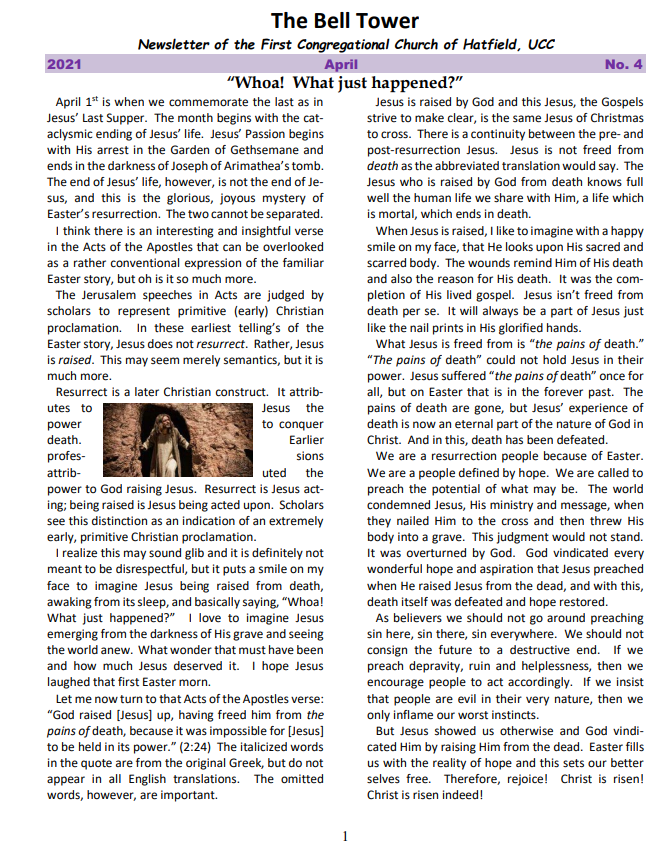
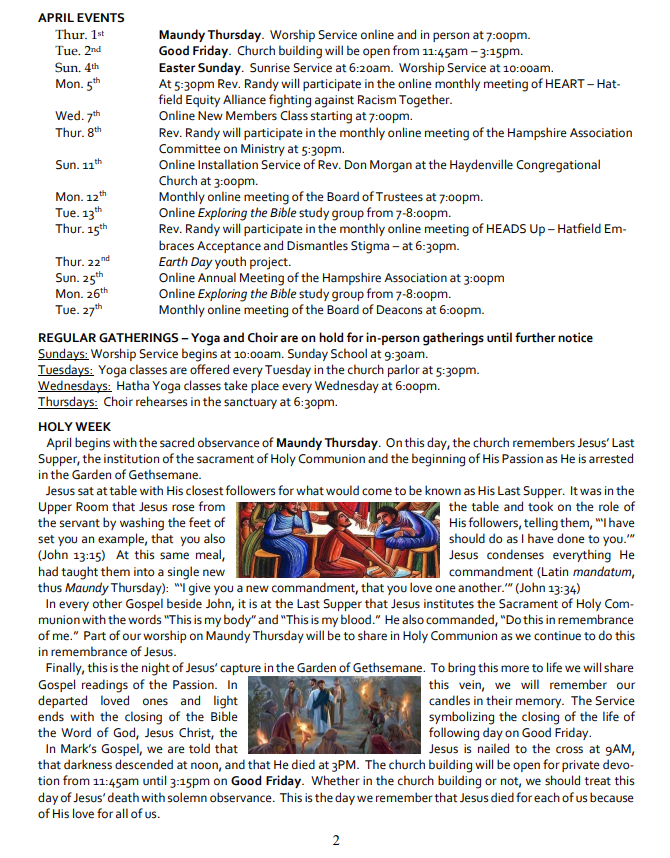
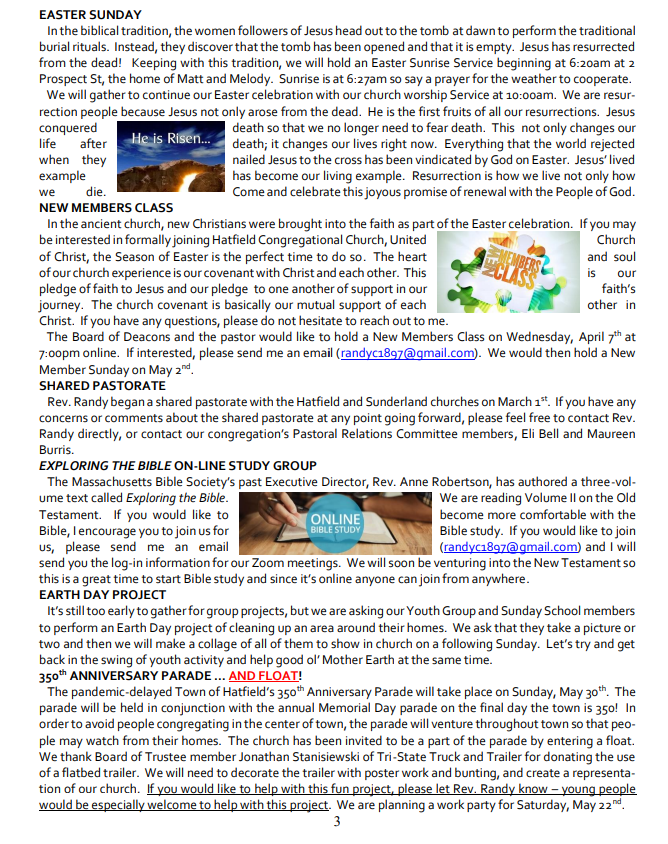
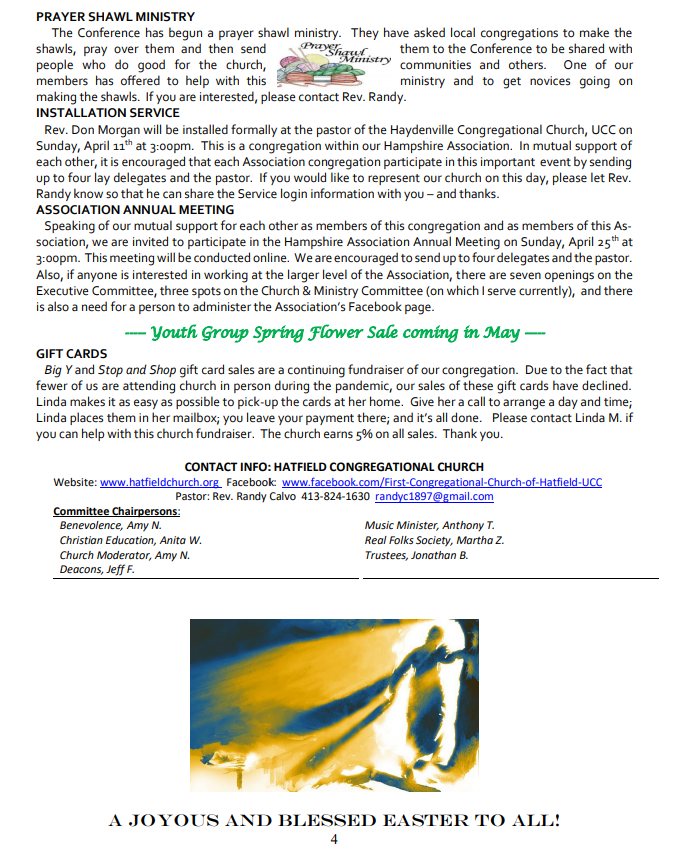
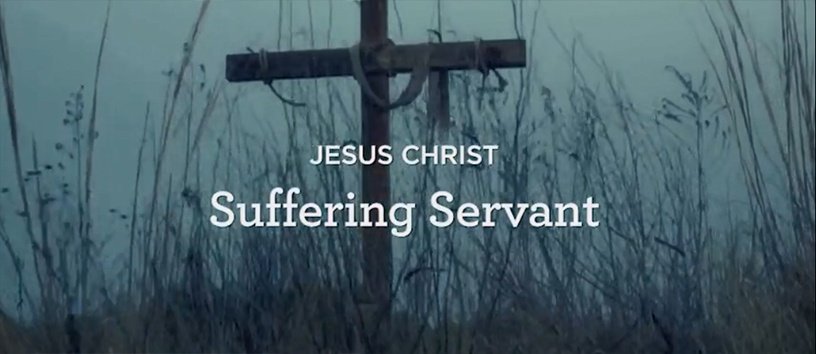



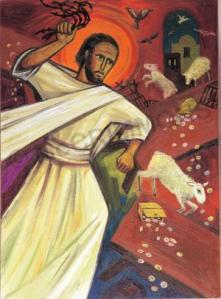



 RSS Feed
RSS Feed
